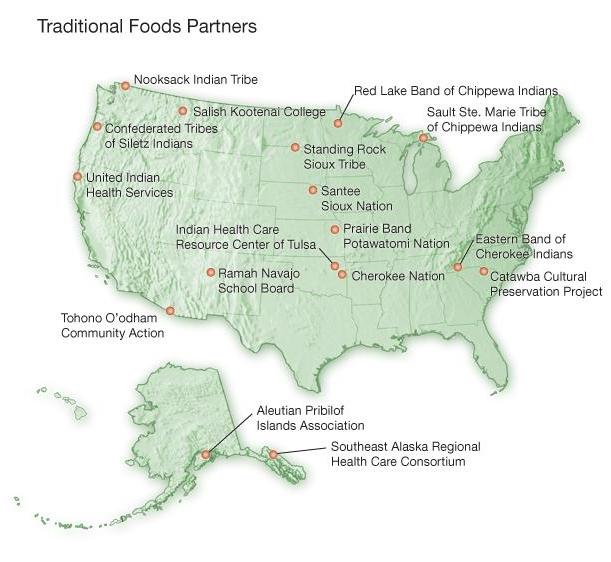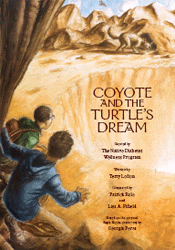Traditional Foods Project
Resources & Tools

On This Page

Using Traditional Foods and Sustainable Ecological Approaches for Health Promotion and Type 2 Diabetes Prevention in American Indian and Alaska Native Communities is a 5–year grant that champions 17 tribal programs striving to restore local, traditional foods, and related physical activity, while strengthening social support. From South Carolina to Alaska, projects reflect the wisdom of indigenous cultures as distinct as the land each partner calls home.
The grant encourages communities to track project efforts for program improvement and project sustainability purposes. Emphasis also is placed on the importance of communities recording and sharing stories about healthy, traditional ways of living.
Project Goals
Overall, the "Traditional Foods" project goals are to—
- Support traditionally-oriented, sustainable, evaluable ecological approaches to diabetes prevention, focusing on community efforts to reclaim traditional foods and physical activity in their communities.
- Encourage local policy changes to increase availability and access to local, traditional foods and forms of exercise.
- Revive, create, and preserve stories of healthy traditional ways shared in homes, schools, and communities.
- Engage community members to follow program progress with an eye towards improvement and sustainability; participate in health promotion activities; explore diabetes in context with history, with social support; and share stories of hope for preventing diabetes and its complications.
Traditional Foods Partners
Aleutian Pribilof Islands Association (Alaska)
Program title: The Aleut Diet Program. The project engages in sustainable hands-on opportunities focusing on the healthy preparation and using local traditional foods to promote health and prevent diabetes. The program improves health through increased awareness of the nutritional benefits of traditional foods. Activities include written nutritional content information to accompany traditional foods preparation demonstrations, meal preparation using traditional foods as part of a healthy diet, public dialogue on the role traditional foods play in helping to prevent diabetes and other dietary-related diseases, improvement of the variety of healthy food choices sold in the local stores, and lessening children’s access to sweetened beverages in local stores.Catawba Cultural Preservation Project (South Carolina)
Program title: Catawba Lifestyle and Gardening Project. Program increases awareness and use of traditional foods and food practices by supporting individual and community gardens; increase fruits, vegetables, beans, and herbs in tribal members’ diets by providing access to gardens and a tribal farmer’s market. The tribe is adopting policies that include preferred ecological methods for gardens using traditional growing methods to encourage a new generation of environmental stewards to care for the reservation ecosystem. The tribe is increasing physical activity with gardening, fishing, and canoeing.Cherokee Nation (Oklahoma)
Program title: Cherokee Nation Healthy Nation/Foods Project. The Cherokee Nation promotes the cultivation, gathering, preparation, and preservation of traditional Cherokee foods and uses traditional Cherokee games for the prevention and treatment of type 2 diabetes. Due to dispossession of lands and relocation, many of the traditional Cherokee foods practices have been lost or practiced by only a small portion of the Cherokee population. Many of the practices and knowledge exist with the elders of the Cherokee Nation. This project works to retain and disseminate that knowledge.Confederated Tribes of Siletz Indians (Oregon)
Program title: Siletz Healthy Traditions Project. The program engages the tribal community in activities that promotes healthy traditional ways of eating, being active, and preserving culture in support of diabetes prevention and wellness. The Healthy Traditions Project provides trainings, such as container garden workshops and youth culture camps, to improve the health and well-being of the Siletz community. The culture camp combines traditional foods and physical activities through gathering and fishing; and the processing, preserving, and preparation of traditional foods. Tribal men are serving as role models and teaching the youth about fishing and gathering and preparing food.Eastern Band of Cherokee Indians (North Carolina)
Program title: Healthy Roots for Healthy Futures. The project increases awareness, knowledge, value, and use of traditional ways of eating and being active among the Eastern Band of Cherokee Indians. Activities concentrate on the cultivation and distribution of and education about traditional foods, as well as awareness, quality, and use of traditional Cherokee trails. School gardens serve as learning labs for the cultivation of native plants, food safety/security, science, social justice, and tribal heritage. In additional to school gardens, efforts focus on the developing farm-to-school systems, community gardens, and farmer’s markets to increase availability and access to local, healthy, and traditional foods. On the basis of existing oral histories and talking circles, marketing campaigns promote the positive connection between cultural pride, healthy traditional foods, and traditional physical activity.Indian Health Care Resource Center of Tulsa (Oklahoma)
Program title: Building Community—Strengthening Traditional Ties. The program encourages American Indian families to eat nutritious diets and adopt healthy active lifestyles. Families participate in school-based health, nutrition, and physical education programs, including summertime wellness camps and a theatrical production. The program also engages in policy advocacy, and educational programs that emphasize healthy lifestyle choices within the context of traditional cultural practices, such as expanding existing and creating new neighborhood and school-based gardening projects. Building Community established gardening partnerships with two local elementary schools, summer camp programs featuring the CATCH curriculum, and worked with state policy makers on healthy food initiatives to address the problem of "food deserts."Nooksack Indian Tribe (Washington)
Program title: Listen to the Elders: Healing Nooksack Health through History. The tribe strives to decrease the occurrence of diabetes amongst tribal members through increased adherence to traditional healthy diets and physical activity. The Healthy People 2020 indicators for physical activity, overweight, and obesity provide the framework for the program to achieve its goals, focusing on the cultural context of traditional foods and historical activities. Activities include elders building and maintaining organic gardens, which combine physical activity and traditional foods access. Improved access to traditional healthy foods is achieved by the development of a traditional foods cookbook. The cookbook is accessible online and includes traditional local recipes.Prairie Band Potawatomi Nation (Kansas)
Program title: Return to a Healthy Past. The Prairie Band of Potawatomi Nation produces traditional Prairie Band Potawatomi foods, which unite generations (children, youth, adults, and elders) when used. The production of traditional foods affects all systems that create the hub of community life. The program reintroduces traditional foods and food preparation methods, encourages physical activity through walking tours, and engages in policy changes that assure preservation and transmission of cultural knowledge and practices to improve health and prevent diabetes. Activities focus on increased knowledge, availability, and access to traditional foods, physical activity, and social support. Traditional foods grown through this program are distributed to various organizations around the reservation, including child care facilities, Head Start programs, the Boys and Girls Club, and the Elderly Center. The Harvest Festival was successfully launched in November 2009 with donations from tribal members invested in restoring the health of the nation. Tribal members contributed to cooking efforts, and provided traditional foods including pumpkins, milk weeds, and wild rice to supplement the foods produced by the gardens.Ramah Navajo School Board (New Mexico)
Program title: Empowering Ramah Navajo to Eat Healthy by Using Traditional Foods. The Ramah Navajo community, also known as Tlochini’ Dine’, has developed programs to help prevent diabetes and other chronic diseases through the re-introduction of traditional foods, increased opportunities for physical activity, social support, and promotion of policy change. The program is re-establishing a sustainable dry-land agriculture system by conducting composting workshops which promote organic growing methods and water harvesting. The program is developing an "honor walk" that educates the community about Navajo Long Walk history and integrates a sustainable physical activity and social support program.Red Lake Band of Chippewa Indians (Minnesota)
Program title: Old Ways for Today’s Health. Utilizing community elders for guidance, this project focuses on seasonal traditional foods teaching camps for youth and community members; such as, harvesting and gathering berries, wild rice, hunting and fishing, maple sugar bushing, and gardening in the four major reservation communities. The project also engages in activities to promote access to healthy traditional physical activities, including powwow dancing for those with diabetes, pre-diabetes, and all community members. A community health education campaign and community gatherings are used to increase family knowledge about and using traditional healthy foods.Salish Kootenai College (Montana)
Program title: Traditional Living Challenge and Ancestor’s Choice. The community is restoring indigenous permacultural practices and creating mentoring relationships with elders and youth. Emphasis is on traditional ways of learning surrounding food gathering, hunting, and preparation using traditional Living Challenge and Ancestors’ Choice health promotion interventions. Goals are accomplished through community collaboration and local, regional, and national partnerships for Ancestors’ Choice and RezChef expansion and distribution of food products and educational materials. Indigenous nutrition classes for children will be held using theater, song, puppet, and teacher training to encourage healthy food choices. Eagle Book stories are being modified in skits for children to include Ancestors’ Choice.Santee Sioux Nation (Nebraska)
Program title: Wiconi Unki Tawapi—Healing Our Lives. The project educates tribal members about the importance of traditional healthy foods and physical activity through traditional food growing, harvesting, distributing, and preparing. The tribe expands on traditional food gathering practices. Activities include physical activity opportunities and social support through the Young Braves Youth Group and Elders Share the Past talking circles. The program encourages all to understand that "sometimes our traditional ways hold the answers." The Santee Sioux Traditional Foods Young Braves program features outdoor, hands-on classroom lessons grounded in cultural heritage about foods and activity.Sault Ste. Marie Tribe of Chippewa Indians (Michigan)
Program title: Uniting to Create Traditional and Healthy Environments. The program sustains traditional knowledge and establishes community policies to create and maintain lifestyle changes to prevent diabetes and promote physical, mental, spiritual, and emotional health. The community engages in identifying and sharing stories of healthy traditional ways of eating and being physically active. The project enhances the re-introduction of indigenous foods and practices specific to the land, history, and culture of the Anishinaabe People across many communities on the reservation that includes starter plants and gardens. The program is developing a trading post as an outlet to buy, sell, or trade local foods and goods.Southeast Alaska Regional Health Care Consortium (Alaska)
Program title: WISEFAMILIES Through Customary and Traditional Living. WISEFAMILIES supports community-driven programs in Kake and Wrangell, Alaska, that build on healthy traditional ways of eating, being active, and communicating health information through storytelling leading to preventing diabetes and other chronic disease. An important part of the program engages community members affecting health policy change in schools, senior centers, grocery stores, and community groups. Digital storytelling workshops engages youth, elders and professional Tlingit storytellers, enhancing communication of wellness messages.Standing Rock Sioux Tribe (North Dakota and South Dakota)
Program title: Native Gardens Project: An Indigenous Permaculture Approach to the Prevention and Treatment of Diabetes. The Standing Rock Sioux Tribe is reclaiming cultural knowledge and traditions to promote health and prevent type 2 diabetes across eight districts in North and South Dakota. Strong partnerships with the Standing Rock Nutrition for the Elderly Program United States Department of Agriculture Food and Nutrition Services and Senior Farmer’s Market Program, Sioux County Extension Service, Boys and Girls Clubs, and National Relief Charities have yielded early results, aligning with a number of CDC’s recommended strategies for communities striving to promote health and prevent obesity. The partners increased availability and access to fresh local foods in their first year. Three farmers’ markets and four roadside stands were established and over 60% of local foods vouchers distributed to elders have been redeemed, totaling over $17,000 in fresh foods and encouragement for local farmers.Tohono O’odham Community Action (Arizona)
Program title: O’odham Ha’icu Ha-Hugi c Duakog: Tohono O’odham Food, Fitness & Wellness Initiative Project. The interventions of the Tohono O’odham Food, Fitness & Wellness Initiative project focus on establishing systems changes to prevent diabetes using strategies that increase education and access to local, healthy, indigenous foods, and improves policy initiatives in schools, tribe, state, and federal levels that address using traditional foods. In recognizing that the ultimate choice of behavior rest on individuals, the viability of those choices requires systems that allow for and support healthy decisions. Through partnerships with the Indian Oasis-Baboquivari School District administrators, farmers, cafeteria staff, and Y.O.U.T.H. group (Youth O’odham United Through Health), approximately 1,000 students at the primary, intermediate, and high schools were served dishes with tepary beans, a traditional crop of the Tohono O’odham. The students voted for tepary beans over commercially provided foods such as pizza.United Indian Health Services (California)
Program title: Food is Good Medicine. The project promotes the exchange of intergenerational cultural knowledge and practices related to traditional foods, contributing to healthy lifestyle and risk reduction for type 2 diabetes. Young adults and youths are engaged in leadership projects and summer camps that include cooking demonstrations and digital storytelling. The project increases access and availability of produce from the Potawot Community Food Gardens that is distributed to communities served by United Indian Health Services. Materials, such as guides and toolkits, are being developed to promote and honor traditional foodways. Community events and conferences are being planned to increase awareness and education about traditional foods and sustainable ecological approaches.
Eagle Books Toolkit
Order Free Eagle Books from CDC
Coyote and the Turtle’s Dream
Contact Us:
- Centers for Disease Control and Prevention
1600 Clifton Rd
Atlanta, GA 30333 - 800-CDC-INFO
(800-232-4636)
TTY: (888) 232-6348 - cdcinfo@cdc.gov






